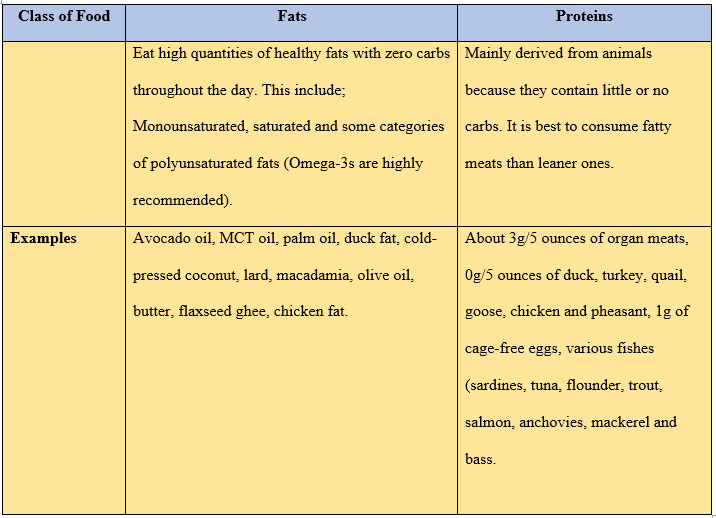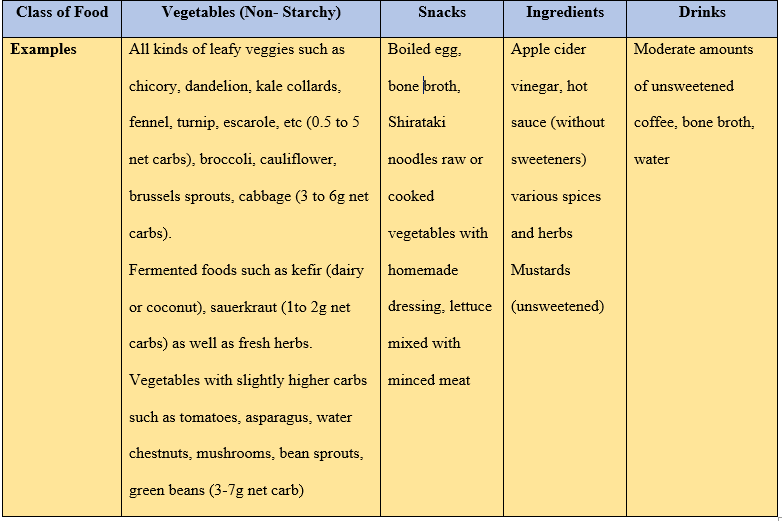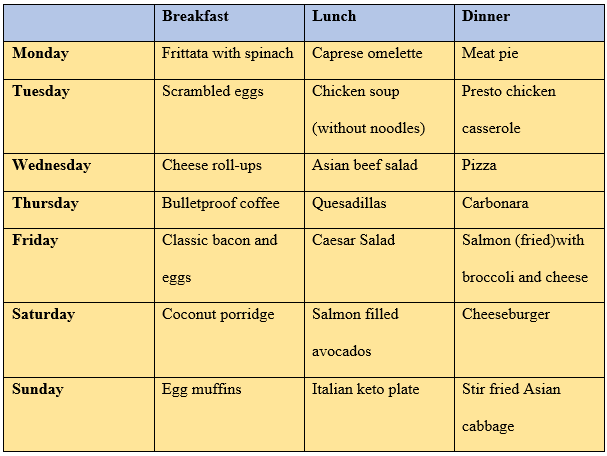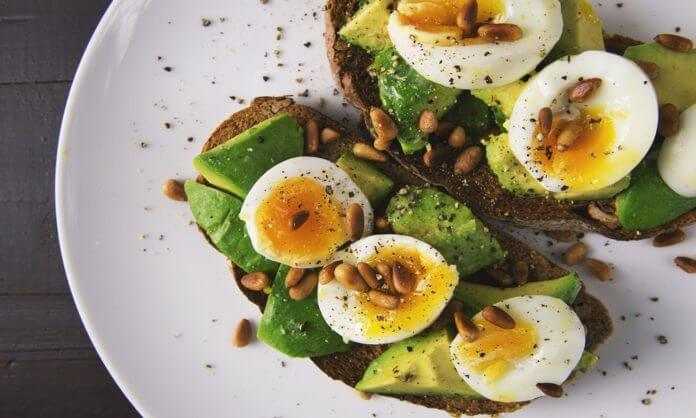The Ketogenic diet has gained significant attention in the last few years because of its increasing benefits to the brain specifically and body in general. While research has revealed the reasons why the Keto diet is highly effective [1], other ways in which this diet benefits the body is still being discovered. This diet is beneficial to the human body mainly because it helps the gut maintain a balance between harmful and helpful bacteria. When you eat harmful foods such as excessive sugar, highly processed foods, low fibre foods, etc. there is a high chance that inflammation within your gut will increase leading to conditions such as leaky gut, dysbiosis and Small Intestinal Bacterial Overgrowth (SIBO). If you want to learn how to boost your gut and overall health with the Keto diet, this article is for you.
What is “Keto”?
Keto is the short form of ketogenic diet, because this diet enables the body to produce an alternative source of fuel, especially when glucose (blood sugar) is reduced in the body. These small fuel molecules are referred to as ketones [2]. These molecules are produced when you eat fewer carbs and moderate quantities of protein because your body can quickly break them down into glucose. In addition to the ketones the liver produces from fat, your body will have enough fuel to serve your body functions. Apart from having enough fuel, your gut microbiome will be populated with beneficial bacteria, thereby preventing inflammatory conditions that result in leaky gut, dysbiosis or SIBO.
What is Keto Diet?
A keto diet allows your body’s entire fuel supply to switch completely to fat, burning fat the entire day [2]. This is possible because you will eat low amounts of carb and moderate quantities of protein, which the body can burn off faster. After utilising the energy produced from carbs and proteins, it switches its attention to body fat, especially when insulin level is low. Thus, for those trying to shed off extra weight, the keto diet is recommended. The process which the body produces ketones is called ketosis, commonly achieved through fasting. However, since we cannot fast indefinitely, the keto diet is the easiest way to achieve the benefits of fasting, without actually fasting.
What does a Keto Diet Recommend?
To achieve ketosis, you must avoid eating a lot of carbs. The keto diet recommends keeping carb intake to less than 50 grams daily and if possible under 20g. The lesser carbs you eat, the greater the likelihood of reaching ketosis. Achieving a low carbs diet requires that you count the carbs especially at the initial stages. The ketogenic diet also recommends removing carbs that contain loads of sugar and starch as well as processed food from your menu. The biggest challenge for those who are just starting out on the Keto diet plan is understanding which high-fat low-carb meals they can consume and Visit Nested Naturals.
Keto Diet Food List
The biggest challenge for those who are just starting out on the keto diet plan is understanding which high-fat low-carb meals they can consume [2]. Thus, it is always important to remember that when you are on a ketogenic diet, majority of calories are derived from foods that contain natural fats and an average quantity of foods with protein. It is also critical to restrict intake of foods that contain lots of carbs. Therefore, the keto diet plan not only provides you with loads of energy for daily activities, it also repairs your gut from SIBO, leaky gut and dysbiosis, by balancing gut microbiomes.
Fats and Proteins

Vegetables, Snacks, Ingredients, Drinks

If you want to try the keto diet, you may be wondering how to plan a meal. Check out the ketogenic diet plan below for a step-by-step guide on how to plan your keto meals for a week. The daily meals include breakfast, lunch and dinner with as much variety as possible. You can eat a simple breakfast like scrambled eggs or to save money and increase your ketosis [3], skip it all together. To avoid problems like keto flu [4], ensure that you take enough fluids. With the one-week meal plan below, you can eat a variety of keto meals that contain less than 20g of carbs. There are several other recipes, feel free to try as much as you can (depending on your food choices and allergies).
Note: all the foods are Keto.

Health Benefits for Children
Autism
Scientists have confirmed the relationship between gut health and autism spectrum disorder (autism) [5]. This is why diets such as keto, which provide a healthy gut, are essential to managing autism. For example, a study done by Newell and colleagues, which explored the ability or otherwise of the 10-14 day keto diet plan to produce beneficial effects in the gut of an animal model with autism, made some amazing discoveries. The research found that the ketogenic diet was able to reduce all microbial content in the intestines and stool and decreased the proliferation of Akkermansia muciniphila microbes in the gut. Most importantly, there was a significant reduction in bacteroidetes, which are typically abundant in autism. All of this result in a decrease in pathogenic microbes that produce inflammation in the brain and other parts of the body. This leads to a reduction in neurological symptoms associated with autism, as was reported by the aforementioned study [6].
SIBO (Small Intestinal Bacterial Overgrowth)
Since the Keto diet plan emphasises the reduction in carb meals, this would rob microbiomes of food they crave and survive on [7]. By effectively starving and eventually killing these harmful bacteria, you relieve symptoms of small bowel intestinal overgrowth since they are less active. However, it should be noted that when treating SIBO with antimicrobials may not be as effective as using the Ketogenic diet plan because the microbes harder to kill in a suppressed state. Even though SIBO is a tricky and stubborn “opponent”, you can beat it if you stay true to the Keto diet plan.
Epilepsy
For almost a century, and with more researchers have shown that the ketogenic diet plan is effective in treating epilepsy [8]. According to a well-known paediatric neurologist, Dr Jong Rho, while the exact mechanism of Keto diet on seizures is not well understood, there are several reasons for its ability to improve brain function in children (as well as adults) with neurological conditions. Firstly, ketones provide the energy deficient brain a larger and cleaner (reduced oxidative stress) alternative energy source. Secondly, ketones have a neuroprotective effect on the brain, thereby inhibiting neuronal death. Thirdly, since inflammation is a huge risk factor for seizures, the keto diet is anti-inflammatory keeping the brain free from foreign bodies. Fourthly, the epigenetic effects of the ketogenic diet prevents the expression of certain genes and proteins associated with neurologic conditions. Finally, it improves transmission of nerve signals at various ion channels.
Keto Diet for Children
If you are wondering whether the keto diet plan is generally beneficial for children, you should understand that it was initially created for kids as a treatment for epilepsy. For example, children of all ages require a good quantity of fat and iron to grow properly [9] physically and mentally (in terms of brain development). The sources of protein and fat for children is similar to that of an adult’s keto diet plan. However, children do not need any carbs in their diet and these should be eliminated.
For breakfast, kids can have eggs/bacon, keto smoothies, waffles or pancakes. For lunch/dinner, keto pizza, keto enchiladas, sandwiches made with low carb bread, buffalo bites and meatballs. Desserts and snacks can be fat bombs, keto cookies, keto nuts/seeds, etc.
However, you should note that kids are very fussy and may initially resist any change of diet. Therefore, it is recommended that you educate your children on how food influences their overall health and encourage them to make healthier choices.
Is Keto Diet Suitable for Children?
Kids can be on a keto diet and it does help those suffering from certain health conditions. Research does indicate that certain forms of the keto diet that restrict proteins, calories does inhibit growth [9]. Is is important that special care must be taken if you consider a keto diet for your child. check out this article
Keto and GAPS Diet – Is it Related?
What does the keto and GAPS diet have in common? They both have an emphasis on improving brain health – GAPS focus on the gut-brain connection and keto on ketones to heal and calm the brain of your child.
Weekly Meal Planner
Want to save time, money, stress, and even get your picky kid to eat? Meal planning will help organise your meals ahead of time, offering fresh, delicious, simple meals that cater to your dietary requirements.
You can check out the Weekly Meal Plan App here.
IMPORTANT: Before undertaking a specific diet, consult with a health practitioner or dietician who can understand your personal health condition and history and work with you to create a personalised protocol. The content on this page is based on my research and should not be considered as health advice
References
- Peter Attia. Ketosis – advantaged or misunderstood state? (Part I). https://peterattiamd.com/ketosis-advantaged-or-misunderstood-state-part-i/
- Balasse EO, Fery F. Ketone body production and disposal: effects of fasting, diabetes, and exercise. Diabetes Metab. Rev. 1989;5:247–270.
- Yancy WS Jr, Olsen MK, Guyton JR, Bakst RP, Westman EC. A low-carbohydrate, ketogenic diet versus a low-fat diet to treat obesity and hyperlipidemia: a randomized, controlled trial. Ann Intern Med 2004;140:769-777
- Manninen AH. Metabolic Effects of the Very-Low-Carbohydrate Diets: Misunderstood “Villains” of Human Metabolism. Journal of the International Society of Sports Nutrition. 2004;1(2):7-11
- Li, Q. Han, Y. Dy, A. & Hagerman, R. J. (2017). The Gut Microbiota and Autism Spectrum Disorders. Frontiers in cellular neuroscience, 11, 120. doi:10.3389/fncel.2017.00120
- Newell C, Bomhof MR, Reimer RA, Hittel DS, Rho JM, Shearer J. Ketogenic diet modifies the gut microbiota in a murine model of autism spectrum disorder. Molecular Autism. 2016;7(1):37.
- Clemente, J. C. Ursell, L. K. Parfrey, L. W. & Knight, R. (2012). The impact of the gut microbiota on human health: An integrative view.Cell.
- Verrotti, A. Iapadre, G. Pisano, S & Coppola, G (2017) Ketogenic diet and childhood neurological disorders other than epilepsy: an overview, Expert Review of Neurotherapeutics, 17:5, 461-473
- Eilee, P. G. Vining, Paula Pyzik, Jane McGrohan et al, Growth of Children on the Keto Diet. PMID: 12455855



6 Comments
This is a great article. It explains the “Keto” diet in detail. Will be looking into this for my son. Thank you
Is there a difference between Keto, GAPS and FODMAP diets?
Hi Jessie,
The Keto diet is a low carb, high fat diet. The FODMAP diet is a low carb diet focusing on removing Fermentable-Oligo-Di-Monosaccharides-And-Polyols (FODMAPs) which are carbohydrates that upset the microbiome. GAPS diet focuses on healing the gut, rebalancing the good bacteria and enhancing the immune system. Hope this helps.
Great article about Keto! I’ve been slowly looking into it more and more and thinking about starting this lifestyle. I think you worded it in a way that makes it easy to understand and shows parents how healthy it can be for children as well!
Thanks Bethany for your feedback.
Pingback: GAPS Diet Plan- Helping to Solve Gut Issues - Mummy and Child